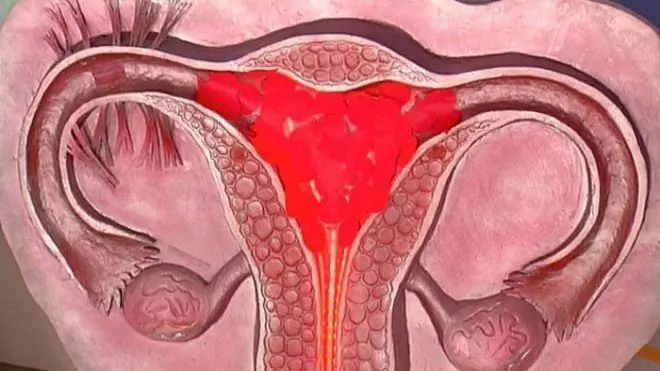- Author Rachel Wainwright wainwright@abchealthonline.com.
- Public 2024-01-15 19:51.
- Last modified 2025-11-02 20:14.
Constipation after childbirth with breastfeeding
The content of the article:
- What is constipation
- Causes of occurrence
- Constipation complaints
- Treatment methods
- Food
- Drinking regime
- Physical activity
- Medication correction of bowel function
- Contraindications
Constipation after childbirth while breastfeeding is a common problem. The reasons for delayed, difficult or systematically insufficient bowel movement lie in hormonal changes, unbalanced nutrition and a sedentary lifestyle of a nursing mother. What to do in this case? Compliance with certain requirements in the preparation of a food ration, drinking regimen, walks often allow you to establish bowel function without taking additional medications. The lack of effect allows the use of laxatives, but not on a permanent basis.

Constipation in a breastfeeding woman is a common pathology, meanwhile, the choice of remedies for its elimination is limited
What is constipation
A bowel movement three times a day to three times a week is considered normal. The notion that the intestines have to be emptied daily is wrong. This process is different for every woman. When deciding on the presence of constipation, it is important to change the usual stool frequency and the appearance of even one of the following signs:
- a small amount of feces;
- increased hardness and dryness of feces;
- no feeling of complete emptying after the act of defecation.
Many women who are constipated while breastfeeding develop all of these symptoms.
Causes of occurrence
Depending on the etiological factor and development mechanism, several types of constipation are distinguished.
| Separation sign | View | Characteristic |
| Etiological factor | Primary | The result of congenital or acquired during the formation of anomalies in the structure of the colon and its innervation. |
| Secondary | Consequence of past diseases, traumatic intestinal injuries, side effects of certain drugs. | |
| Idiopathic | Violation of the contractility of the large intestine of unknown etiology. | |
|
Development mechanism |
Alimentary | The result of insufficient intake of water, food or dietary fiber. |
| Mechanical | The consequence of organic changes in the large intestine. | |
| Dyskinetic | The result of functional disorders in the intestine. Distinguish between atonic and spastic variants. The first is characterized by weak peristalsis (wave-like contraction) of the intestine, the second by its uncoordinated spastic contractions. |
When it comes to constipation in a nursing mother and its treatment at home, it means problems with defecation that arose during pregnancy and continued after childbirth, and not serious bowel problems that existed before conception. The presence of congenital malformations, organic changes in the colon requires medical attention.
Constipation complaints
In addition to problems with bowel movement during stool retention during breastfeeding (HB), a woman may be bothered by:
- heaviness in the lower abdomen;
- excessive gas formation;
- decreased appetite;
- cramping abdominal pain;
- irritability;
- sleep disturbance;
- decreased performance.
Symptoms are the result of intoxication of the body, which arose due to the untimely evacuation of feces and the reabsorption of metabolic products.
Treatment methods
In order to guaranteed to get rid of constipation, a nursing woman needs to use an integrated approach:
- balance the diet;
- optimize the amount of fluid consumed;
- normalize physical activity;
- use laxatives approved for lactation.
The last point should be resorted to last, if the previously listed measures are ineffective. It is impossible to treat pathology only with medicines. This is the wrong tactic, leading to temporary improvement, addiction to laxatives, and worsening of the problem in the future.
Food
Breastfeeding moms need to know how certain foods affect the colon.
| Effect on the intestines | List of products |
| Promote emptying | Bread with bran and rye flour, buckwheat, barley, oatmeal, dried fruits, especially prunes, raw vegetables and fruits, meat containing a large amount of connective tissue, fish oil, dairy products: kefir, fermented baked milk, yogurt. |
| Delay emptying | Strong black tea, cocoa, quince, currants, blueberries in fresh and dried form, pureed food, dishes with a viscous consistency (semolina, rice porridge, slimy first courses). |
| Cause excessive gassing | Dishes made from cabbage, spinach, sorrel, legumes (peas, beans, beans, lentils), grapes, apple and grape juice. |
Mothers should eat foods taking into account the peculiarities of their influence on the child and their own condition. The appearance of complaints significantly changes the diet.
If constipation is accompanied by bloating, then limit or temporarily exclude foods that cause gas and contain a large amount of coarse dietary fiber. The same tactics are followed in the presence of spastic pain.
The frequency of food intake is no less important than its composition. The correct diet provides for the absence of long breaks: you should eat at least 4-5 times a day in small portions.
Drinking regime
When breastfeeding, the need for fluid in women increases. Adequate amount of water is also required to normalize the functioning of the large intestine. The minimum volume of liquid for the lactation period is 1.5 liters, the optimal volume is 2-2.5 liters.
For constipation, it is useful to drink mineral water without gas. If they are accompanied by increased intestinal contractile activity and spastic pain, then in a warm form.
Physical activity
A nursing mother needs to walk with her baby in the fresh air. Sufficient physical activity normalizes blood circulation in the pelvic organs of a woman, promotes better bowel function, and has a beneficial effect on the neuropsychic sphere.
Physiotherapy is useful. You can start 1.5 months after giving birth with a short warm-up, exercises to strengthen the abdominal muscles, pelvic floor. The complexity and duration of classes should be increased gradually.

Physiotherapy exercises often help improve bowel function in nursing mothers without resorting to medication.
Medication correction of bowel function
There are several groups of laxatives, but not all can be used during lactation.
| Group of funds | Mechanism of action | Drugs | Use during lactation |
| Propelling intestinal contents | Promote irritation of the intestinal receptor apparatus, directly affecting the intestinal mucosa: increase peristalsis, stimulate mucus secretion. | Anthraquinone derivatives: Senna preparations (Senade, Senadexin, Galaxena, Kafiol, Regulax); buckthorn preparations (liquid extract, dry extract, syrup); rhubarb preparations (dry extract, Ramnil) | Not recommended |
| Bisacodyl preparations: Bisacodyl, Dulcolax, Laxacodyl, Laxatin, Laxbene, Pirilax | Not recommended | ||
| Picosulfate preparations: Guttalax, Regulax picosulfate, Slabilen, Picodinar, Slabicap | Not recommended | ||
| Osmotic | They increase the volume and soften the stool, lowering the pH level and enhancing the growth of bifidobacteria and lactobacilli. They have a laxative effect without directly affecting the mucous membrane and intestinal smooth muscles. | Salts: magnesium sulfate, sodium sulfate (Glauber's salt) | Not recommended |
| Lactulose preparations: Duphalac, Romfalak, Normaze, Portalak, Dinolak, Goodluck, Poslabin lactulose | Recommended | ||
| Macrogol preparations: Tranzipeg, Forlax, Fortrans, Lavacol | maybe |
A nursing mother without fear, and Dr. Komarovsky agrees with this statement, you can use lactulose preparations and glycerin suppositories at home. The first, when taken orally, are practically not absorbed, spread and reach the large intestine unchanged.
Contraindications
Self-treatment of constipation is possible when it is not accompanied by:
- sharp or growing abdominal pain;
- severe bloating;
- an increase in body temperature;
- vomiting;
- an admixture of blood in the feces;
- bleeding from the anus;
- pain in the anus.
The presence of the listed complaints requires specialist advice and examination.
The regulation of the intestinal rhythm in case of constipation during lactation should begin with the correction of nutrition, drinking regimen, and physical activity. It is not recommended to use enemas and microclysters (Microlax). With prolonged use of any laxatives, addiction gradually develops to them. The constant use of such funds is addictive, and a woman can no longer do without them.
We offer for viewing a video on the topic of the article.

Anna Kozlova Medical journalist About the author
Education: Rostov State Medical University, specialty "General Medicine".
Found a mistake in the text? Select it and press Ctrl + Enter.






